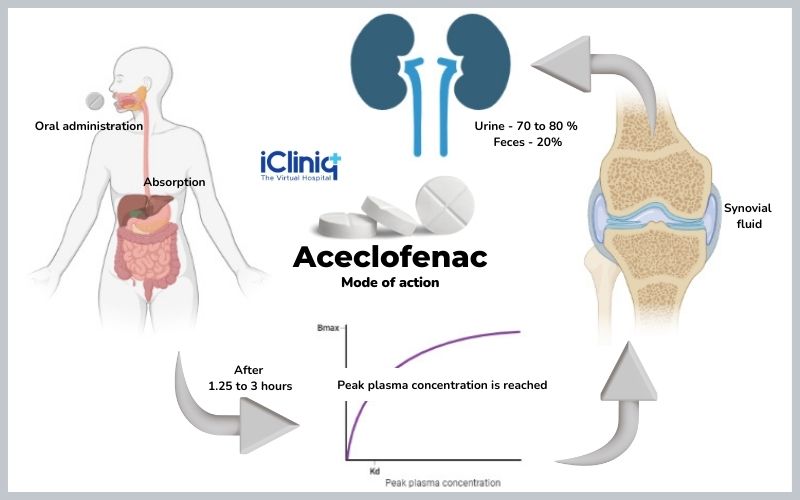Overview:
Aceclofenac is an anti-inflammatory pain killer drug used to relieve and reduce pain in diseases like rheumatoid arthritis, osteoarthritis, and ankylosing spondylitis. Aceclofenac reduces inflammation by blocking the production of prostaglandins, as prostaglandins cause pain and inflammation.
In the stomach, prostaglandins produce mucus that plays a protective role against the gastric acids, thus saving the stomach from ulceration. Patients with stomach complications should always discuss with their doctors before taking Aceclofenac because prolonged use of the drug can result in stomach bleeding.
Drug Group:
Aceclofenac is a nonsteroidal anti-inflammatory drug belonging to the chemical class Aryl acetic acid derivatives, including another drug like Diclofenac. These are termed nonselective COX (cyclo-oxygenase) enzyme inhibitors and stop the pain and inflammation in different osteoarthritis conditions.
What Are the Uses of Aceclofenac?
Aceclofenac is the primary drug of choice to be used for pain management in chronic conditions like rheumatoid arthritis, osteoarthritis, or ankylosing spondylitis.
-
Osteoarthritis: Aceclofenac alleviates painful, tender joints and relieves pain by blocking the production of inflammatory mediators like prostaglandins.
-
Rheumatoid Arthritis: Aceclofenac stops swelling, pain, and stiffness of the joints in rheumatoid arthritis.
-
Ankylosing Spondylitis: Aceclofenac is also prescribed for the condition of Ankylosing spondylitis as it eases pain and inhibits inflammation.
Aceclofenac is less common and is used for muscle pain, toothache, and other bone and joint pain-related issues.
Important:
The instructions of the doctor must be followed if the patient has any gastric, heart, or liver-related complications; it must be discussed with the doctor before consuming Aceclofenac.
How Does Aceclofenac Work?
Aceclofenac acts by the inhibition of the enzyme cyclo-oxygenase, which is consumed to convert arachidonic acid to cyclic endoperoxides, precursors of prostaglandins in the production of prostaglandins; thus, Aceclofenac acts by the blocking the synthesis of prostaglandins by inhibiting cyclo-oxygenase and helps to relieve pain and inflammation.
The Onset of Action:
Aceclofenac is completely and rapidly absorbed from the gastrointestinal tract after oral administration and circulates in the blood mainly in unchanged form. After 1.25 to 3 hours of drug administration, peak plasma concentrations are reached, and the drug gets distributed into the synovial fluid with concentrations up to 60% of that in the plasma. The main Aceclofenac elimination occurs via the urine, with 70 to 80 % of the clearance of the drug and 20% of the dose excreted into feces.
Habit-Forming:
No evidence of habit-forming tendencies due to Aceclofenac has been reported so far.
Expiry Date:
Always avoid toxicity and unwanted effects due to the drug, and it is highly recommended to check the label of the drug for the expiry date.

What Is the Dosage of Aceclofenac?
Aceclofenac is available as a 100 mg tablet and also in combination with other drugs such as Paracetamol or Pantoprazole.
How to Use Aceclofenac?
Always follow the instructions given by the doctor for taking the drug Aceclofenac. It is prescribed to be taken in a dose of 100 mg two times a day, that is, in the morning and evening. It is preferably taken with or after food. This will help to protect the stomach from the complications like stomach irritation and indigestion.
Missed Dose:
If a dose is missed, take it immediately; however, if it is nearly time for the next dose, then take the next dose only and do not overdose.
What Are the Drug Warnings and Precautions?
Aceclofenac should be taken cautiously in the following conditions:
-
If the patient is taking other NSAIDs besides Aceclofenac, it must be discussed with the doctor. NSAIDs tend to cause bronchospasm, so they should be taken carefully in patients with Asthma.
-
GIT bleeding, stomach ulceration, or perforation as NSAIDs tend to decrease the protective mucus layer in the GIT.
-
In case of hepatic or renal problems, Aceclofenac can worsen the conditions.
Caution should be exercised in patients with a history of Crohn's disease, bruising, heart, liver, or kidney disease, gastrointestinal disease, blood clotting problems, systemic lupus erythematosus, elderly, during pregnancy, alcohol-dependent patients, and lactation.
It can cause dizziness, so the patient should not drive any vehicle or operate machinery if he is on this medication.
What Are the Side Effects of Aceclofenac?
If the patient experiences any of the below-given side effects, emergency help from the doctor must be taken.
Some common side effects after consuming Aceclofenac are:
-
Stomach ulceration.
-
Vomiting.
-
Nausea.
-
Dyspepsia or abdominal pain.
-
Skin rashes.
-
Dizziness.
-
Visual disturbance.
What Are the Interactions of Aceclofenac?
Aceclofenac interaction with –
-
Antihypertensive Drugs: NSAIDs can reduce the activity of antihypertensive drugs and thus can increase the complications of heart and kidney diseases.
-
Diuretics: NSAIDs inhibit diuretic activity.
-
Cardiac Glycosides Like Digoxin: NSAIDS can increase plasma glycoside levels and can increase cardiac activity harmfully.
-
Corticosteroids: In combination with NSAIDs, steroids can increase ulcerations.
-
Anti-coagulants: NSAIDs may enhance the effects of anticoagulants, such as Warfarin.
What Are the Common Brands or Trade Names of Aceclofenac?
The commonly available brands of Aceclofenac are:
-
Acenal.
-
Zerodol.
-
Acent Plus.
-
Acicloflex.
-
Acebel-P.
-
Aclo.













